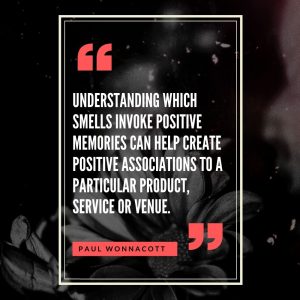Nostalgia is an affectionate feeling you have for the past, especially for a particularly happy time. For a while now we have known that memory and scent are connected. As an aircare company, we are always looking at ways to utilize this knowledge to make the maximum impact on the market. Companies are also increasingly using scent as a way to connect to their audiences, and in particular, to influence their audiences’ decisions — whether by influencing them to buy something in a shop or return to a hotel venue.
When a smell enters the nose, it travels through the olfactory bulb, which helps the brain to process scent. The olfactory bulb is part of the limbic system, which is the emotional center of the brain. This is where the smell starts to conjure up recollections, with different fragrance notes (top notes, middle notes and base notes) that conjure up different memories.
With this in mind, understanding which smells invoke positive memories can help create positive associations to a particular product, service or venue. One sector that could benefit currently from looking to capitalize on this correlation is the retail sector. A recent report by Credit Suisse estimated that across the USA, 20-25% of malls would shut down between 2017 and 2022 largely because of store closures. Retailers announced that more than 8,600 stores would close this year alone.
With the rise of online giants like Amazon, retail stores face increasingly tough competition online, making it crucial for store managers to find ways of bringing their retail environments to life. It is important to then understand why some people continue to choose to travel to places like Nordstrom to do their shopping. Research shows that one reason consumers continue to shop in-store is the desire for the ‘experience’ of it.
Fragrances Tell a Story
When blending a perfume, perfumers work with 500-1000 ingredients in their palette. Perfumers understand when selecting ingredients that each individual ingredient has the ability to tell a story on its own. For example, the smell of pine can conjure up the experience of walking through a forest. When placed with other scents, each scent can participate together in the creation of a particular narrative.
Stories help to create a ‘fragrance experience,’ which appeals to a customer’s sense of nostalgia and their memories. As a retailer, we should be asking questions like ‘how would we like our customer to feel when they experience this scent?’ Penhaglions fragrance house has an online fragrance quiz which asks specific questions of consumers before the suggestion of a scent:
“How would you like to feel when you wear it?”
“Where could you see the fragrance being worn?”
“If the fragrance was a fabric, what would it be?”
It then suggests the best fragrance matched to your answers. These types of questions help to dive deeper into a fragrance and its connection to our senses. The more we can connect to the senses, the stronger the fragrance (and product, or venue) will imprint on our minds.
But it’s not just about creating wonderful fragrances to appeal to people’s sense of nostalgia—fragrances need to be delivered in a way that will provide an impact as well. Manufacturers are using new technologies to develop new ways of delivering scents, whether in liquid, granulated, powdered or solid form. These different delivery methods have the ability to have a different affect and level of impact on people.
Increasingly, we are also becoming aware of the use of potentially harmful chemicals in fragrances. As we become more aware of this problem as a society, these chemicals are becoming more regulated, and so more natural materials are being chosen by companies to align and support the shift enacted by these regulations.
Ultimately, creativity mixed with technical expertise and market awareness means that we can truly explore scents’ connection with nostalgia in a new way.
‘How Nostalgia Can Be Utilized in Scent Marketing‘ By Paul Wonnacott | President | Vectair Systems, Inc. as seen in American Cleaning & Hygiene.





